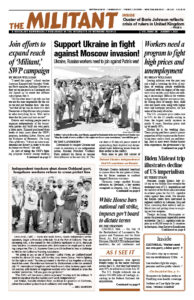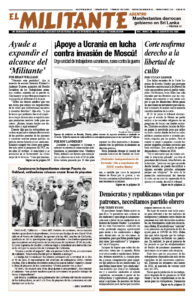Soaring inflation over the past year and a half is battering the lives of millions of working people worldwide. Combined with the impact of the capitalist crisis on jobs, price hikes are making it increasingly difficult for workers to keep things together and raise a family. Rising costs of energy, food, child care and health care, along with higher rents and mortgage payments, are just some of the many obstacles.
The U.S. consumer price index rose to 9.1% for the 12 months ending in June, the largest yearly increase in nearly 41 years. Gasoline prices shot up by nearly 60%.
Hardest hit is the working class. Those getting paid least spend a greater proportion of their income on the fastest-rising items such as food, gas and housing. And as most every worker knows from experience, the government’s figures hide the scope of the crisis. The federal minimum wage of $7.25 an hour is now worth 27% less than 13 years ago.
“It used to be you could get a bowl of fruit lower than your hourly wage,” Janelle Jackson, a member of the United Food and Commercial Workers union, told this reporter in the parking lot of a supermarket in Philadelphia where she works July 18. “Now a bowl of watermelon is $7.99 and half the size it used to be.”
This past year butter was up by 21.3%; eggs, 33.1%; coffee, 15.8%; health insurance, 17.3%; and airplane tickets, a whopping 34.1%.
Real average hourly earnings are down 3.6% over the last 12 months, the greatest decline since the 1970s. At the same time prices rise, factory production is dropping and new orders are falling at the fastest rate since May 2020.
‘Fuel costs have tripled’
Fuel costs have tripled for truck driver Delores Bledsoe. “It’s making me want to get out of the truck and go drive an Uber,” she told The Associated Press July 13 at a truck stop while hauling freight from Carlisle, Pennsylvania, to Wisconsin.
President Joseph Biden sought to downplay the latest figures, as he’s done throughout his presidency, insisting the 9.1% inflation jump was “out of date.” Last month Federal Reserve Chairman Jerome Powell claimed the “economy for now is strong” and “consumers are in good shape,” something nobody who actually works for a living could honestly say.
The Fed — the U.S. government’s national bank — had implemented a steep 0.75% increase in interest rates, forcing higher loan repayments out of workers with mortgages, auto loans, credit cards and other debts. Its board members say a similar interest rate hike, if not more, is likely at the end of the month.
These moves have raised the dollar to a 20-year high against the currencies of major trading partners like Japan and the eurozone. As a result, import costs from the U.S. are higher and governments in semicolonial countries — like Pakistan, Ghana and El Salvador, with some of the highest dollar debts — will find these more and more unpayable, as with Sri Lanka. Bosses and their governments then drive to extract from us more of the wealth produced by the labor of working people and put it into the coffers of banks in the imperialist centers.
The Wall Street Journal editors complained July 14 that during similar inflation in the 1970s, “policy makers lacked the will to contain it.” But whenever governments that serve the bosses try to “contain” inflation, it always involves targeting the jobs and living and working conditions of the working class.
For cost-of-living adjustment clauses
“The labor movement needs to fight for cost-of-living adjustment clauses in all union contracts and benefits, so that whenever prices rise our wages go up automatically,” Joanne Kuniansky, Socialist Workers Party candidate for Congress from New Jersey, told the Militant. “And we need to demand a shorter workweek with no cut in pay — 30 hours work for 40 hours pay — to spread the available work around.”
Inflation is not caused or resolved by bankers tinkering with interest rates. Its origins are in the crisis of the capitalist system. As profit rates decline, capitalists cut investment in capacity-expanding production and equipment. Competition among them sharpens and they press governments to print vast amounts of money. As the supply of money outstrips the output of commodities, prices go up.
Skyrocketing food prices are increasing the number of working people seeking assistance from food banks in order to feed their families. “It’s really impossible to get by now without some help. The prices are way too high,” Tomasina John, a mother of four, told AP as she lined up outside St. Mary’s Food Bank in Phoenix. She said her family had never visited a food bank before.

